Staying hydrated is essential for maintaining good health. Men typically need about 15.5 cups (3.7 liters) of fluids per day, while women should aim for 11.5 cups (2.7 liters). These amounts include all fluids consumed, not just water. About 20% of daily fluid intake usually comes from food, with the rest coming from beverages.
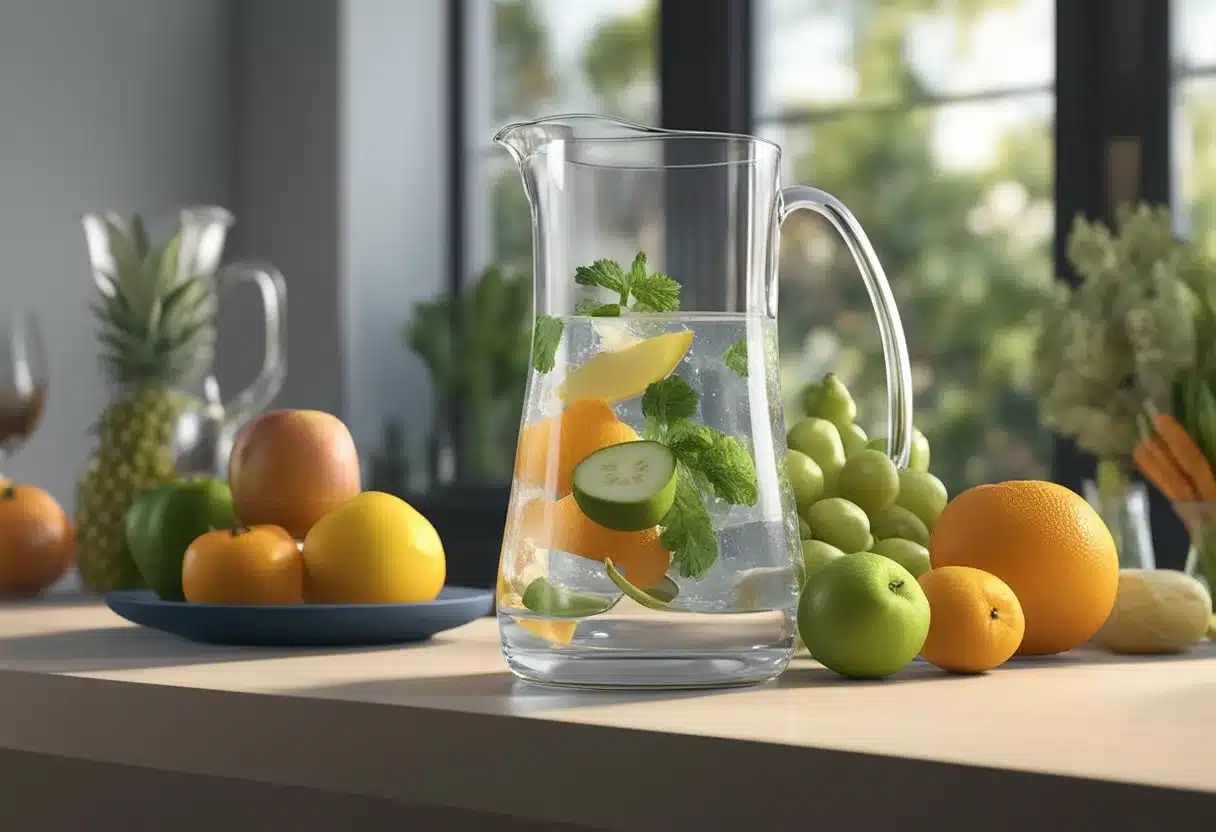
Various factors can influence how much water you need, such as your activity level, climate, and overall health. For example, athletes or people living in hot climates may require more water to stay hydrated. Besides plain water, other beverages and foods like fruits and vegetables can contribute to your daily fluid intake.
Hydration isn’t only about drinking water; it also involves maintaining a balance of electrolytes and other nutrients required for bodily functions. Monitoring your hydration levels and adjusting your intake based on your body’s needs can prevent issues like dehydration or overhydration, ensuring you feel your best every day.
Key Takeaways
- Men need about 15.5 cups and women need 11.5 cups of fluids daily.
- Activity level, climate, and health can affect water needs.
- Hydration includes fluids from beverages and foods.
The Importance of Hydration for Body Function
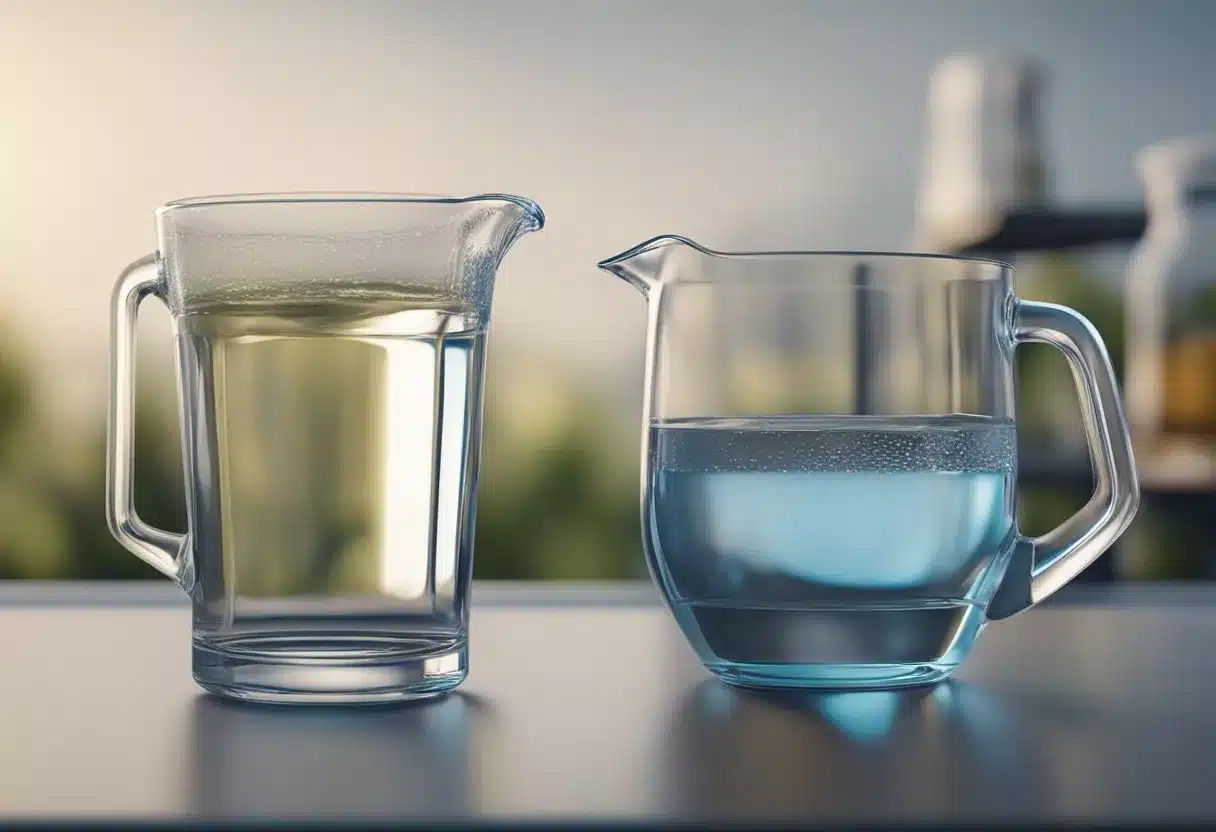
Staying hydrated is crucial for various body functions, including regulating temperature, keeping skin healthy, and maintaining cognitive performance. Proper hydration also supports the kidneys in filtering waste and prevents dehydration-related health issues.
Role of Water in the Body
Water is essential for many body functions. It helps regulate body temperature through sweating and respiration. Fluids are necessary for keeping the skin hydrated, giving it elasticity and preventing dryness. Water helps form saliva and mucus, allowing for easier digestion and nutrient absorption. Blood, which is over 90% water, carries oxygen to cells, ensuring they get the nutrients needed to function.
The kidneys rely on adequate hydration to filter and expel waste through urine. Insufficient fluids can lead to concentrated urine and potential kidney stones. Cells require water to maintain their shape and structure, aiding in overall bodily function. Without proper hydration, these functions can become impaired.
Effects of Dehydration on Health
Dehydration can have serious effects on health. It can cause fatigue, dizziness, and confusion, impacting cognitive function and mood. Dehydration makes the blood thicker and affects circulation, leading to increased strain on the heart. Organs like the kidneys may struggle to filter waste, leading to a buildup of toxins in the body.
The skin can become dry and less elastic, increasing the risk of skin disorders. Persistent dehydration can lead to urinary tract infections, given that regular fluid intake helps flush bacteria out of the bladder. Severe dehydration might cause electrolyte imbalances, affecting muscle function and potentially leading to cramps or spasms. Maintaining adequate hydration is essential to avoid these health issues.
Determining Daily Water Intake Needs
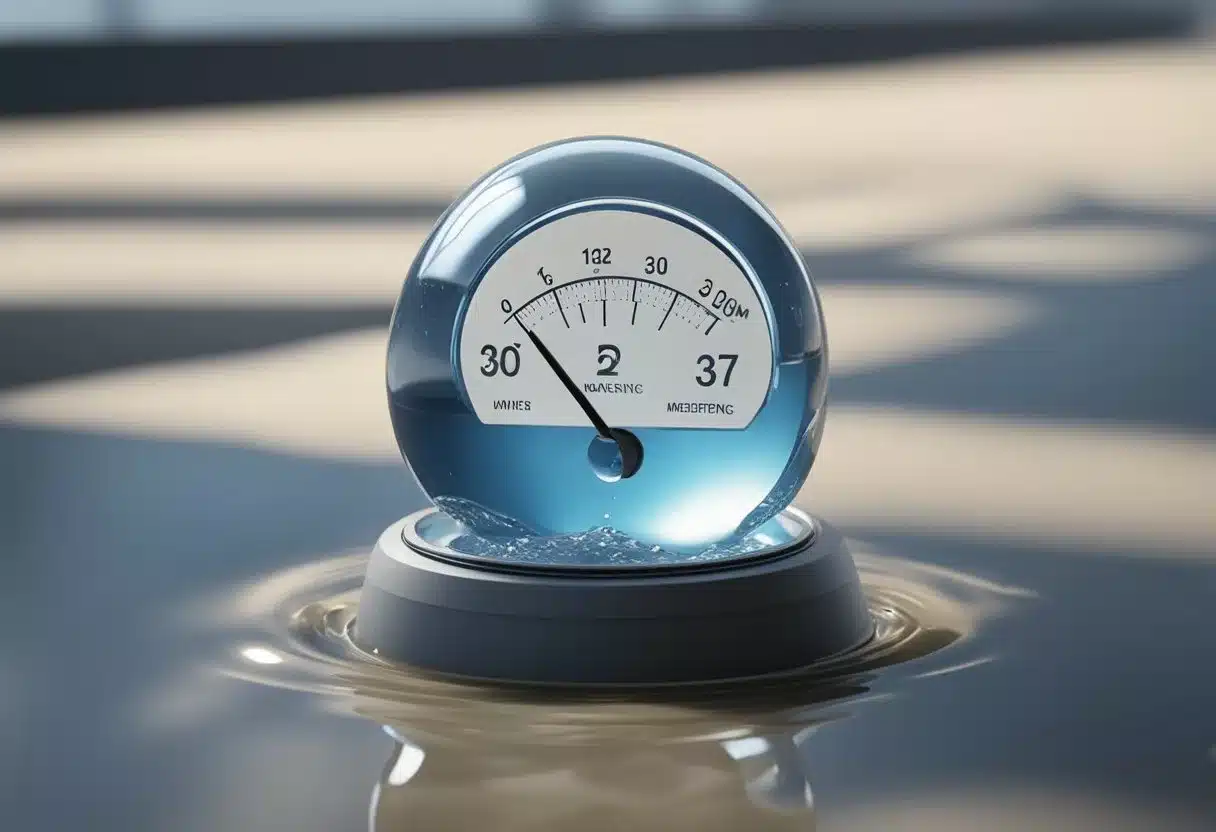
Daily water intake depends on various factors, including a person’s weight, age, and activity level. Additionally, the body’s hydration needs change during different life stages and in response to environmental conditions.
Factors Influencing Water Requirements
Weight and Gender: A heavier person generally needs to drink more water. Men often require more fluids than women due to their typically larger body size. For instance, men may need about 15.5 cups (3.7 liters) of fluids per day, while women might need around 11.5 cups (2.7 liters).
Temperature and Activity Level: Hot weather increases sweat, leading to higher water loss. Athletes or those engaging in physical activities also need more water. For example, if someone exercises heavily or works in hot conditions, they may need to increase their water intake significantly.
Hydration and Different Life Stages
Pregnancy and Breastfeeding: Women who are pregnant or breastfeeding have higher hydration needs. Pregnant women should drink about 10 cups of fluids daily. Breastfeeding women need approximately 13 cups to support milk production.
Children and Elderly: Children need adequate water for growth, and their needs vary by age. The elderly might need to monitor their water intake carefully, as they can sometimes be less aware of their thirst.
Understanding Thirst Mechanism
Body Signals: The body signals dehydration through thirst. It’s important not to wait until you’re thirsty to drink water. Thirst reflects a need for hydration but might not always be a precise indicator of current water needs.
Hydration Monitoring: Monitoring urine color can help gauge hydration. Pale yellow urine usually indicates proper hydration, whereas darker urine suggests a need for more fluids.
By considering these factors, individuals can better understand how much water they need to drink daily to stay healthy and hydrated.
Sources of Hydration
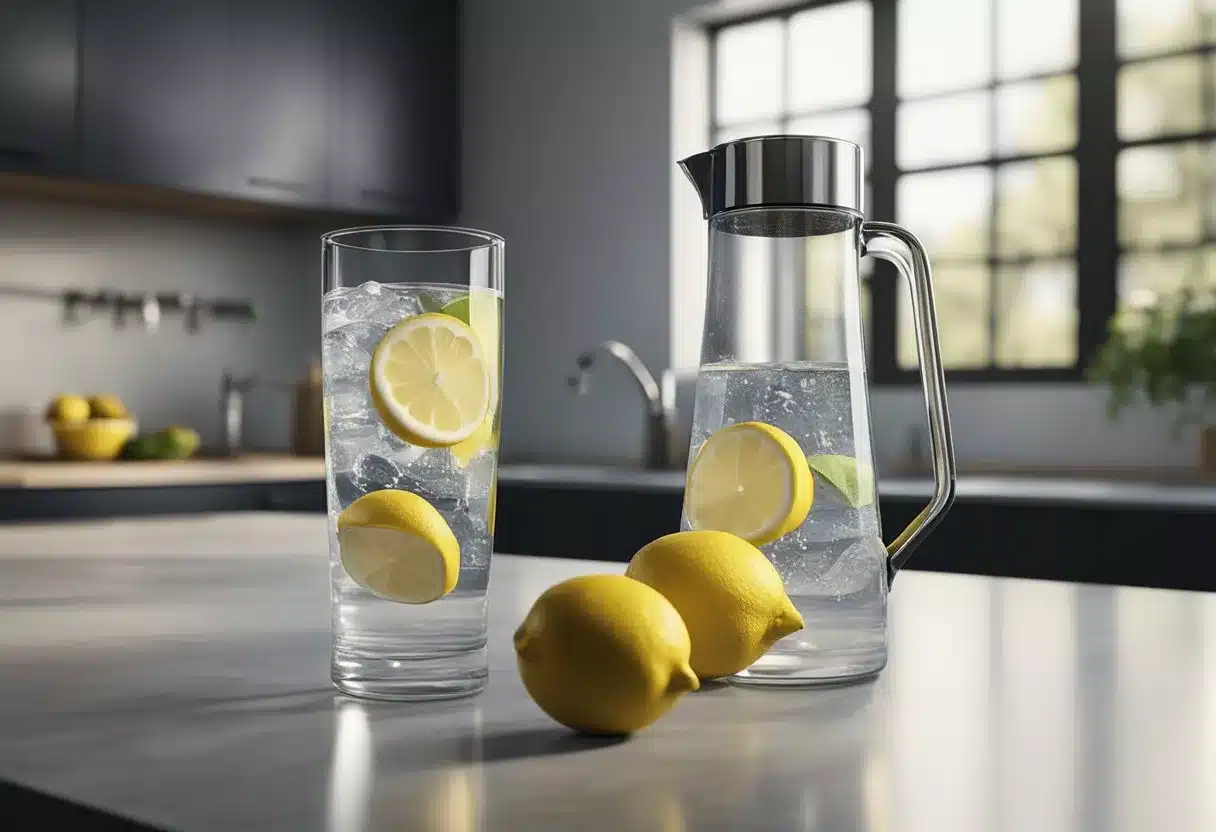
Staying hydrated involves consuming not only water but also other beverages and high water content foods like fruits and vegetables. Both offer essential hydration and contribute to the daily fluid needs of individuals.
Drinking Water and Other Fluids
Water is the most straightforward way to stay hydrated. Adults should aim for about 15.5 cups (3.7 liters) for men and 11.5 cups (2.7 liters) for women, which can include water, milk, and juice. Beverages like tea and coffee also contribute to hydration but be mindful of their caffeine content.
Incorporating various beverages in your diet can help meet hydration needs. Milk provides both water and essential nutrients like calcium and proteins. Juices, especially when freshly squeezed, offer a tasty hydration method but should be consumed in moderation due to their high sugar content. Soft drinks and energy drinks can hydrate but are not ideal due to added sugars and artificial ingredients.
High Water Content Foods
Fruits such as watermelon, strawberries, and cantaloupe are excellent water sources, with water content exceeding 80%. These fruits are easy to incorporate into meals or snacks and provide additional vitamins and minerals.
Vegetables like cucumbers, celery, lettuce, and zucchini are also hydrating and can be added to salads, smoothies, or eaten raw as snacks. They often have over 90% water content, making them effective at boosting daily fluid intake.
In addition to fruits and vegetables, some foods like soups and broths contribute significantly to hydration. These can be especially beneficial during colder months when one might drink less water. Eating a balanced diet that includes a variety of water-rich foods ensures comprehensive hydration.
Hydration Guidelines for Health and Wellness
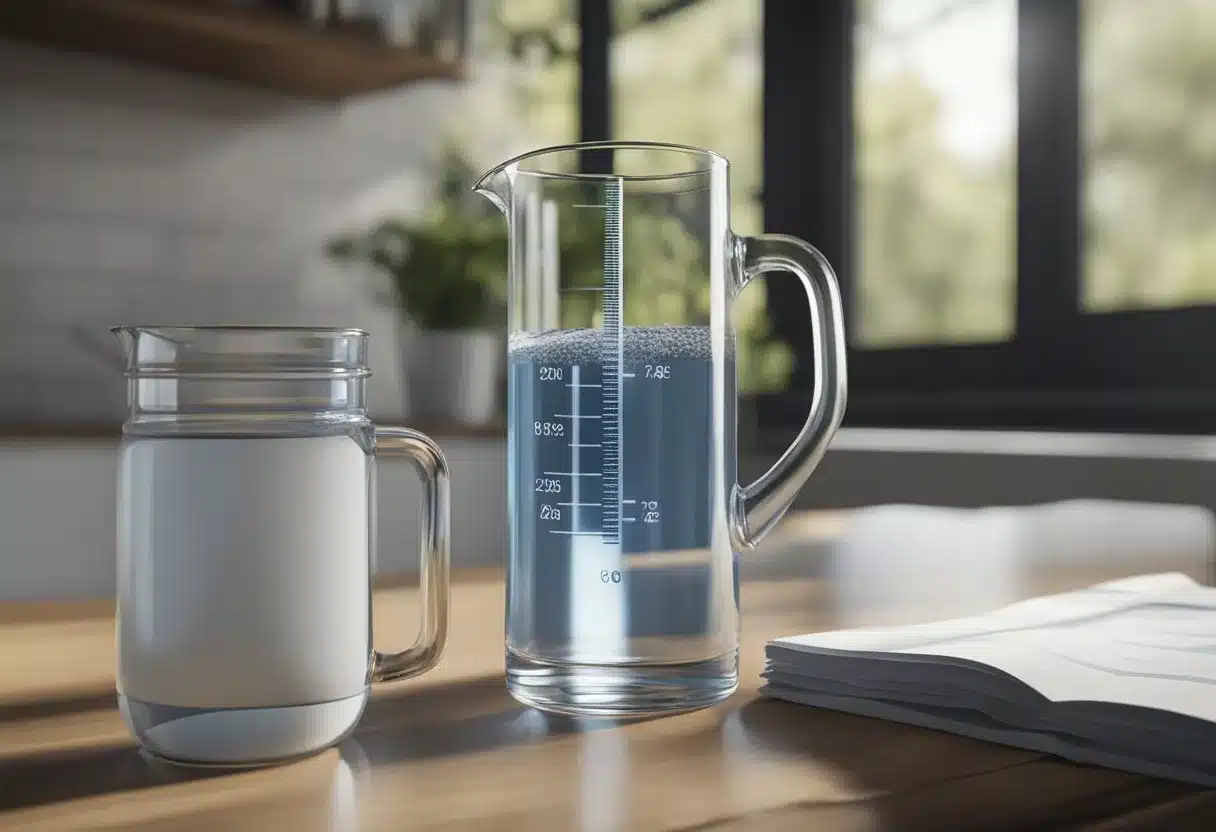
Proper hydration is essential for maintaining health and wellness. Different factors, such as gender, physical activity, and environmental conditions, can influence how much water a person needs.
Recommended Water Intake for Men and Women
The amount of water a person needs can vary by gender. Men typically require about 15.5 cups (3.7 liters) of fluids each day. For women, the recommendation is around 11.5 cups (2.7 liters) daily. This includes all fluids from water, other beverages, and food. Approximately 20% of daily fluid intake comes from food, while the remaining 80% is from drinks. The Cleveland Clinic and Mayo Clinic provide similar guidelines to ensure adequate hydration. It’s important to drink water regularly throughout the day, even if you are not feeling thirsty.
Hydration for Physical Activity and Sports
Physical activity increases the body’s need for water. When exercising, the body loses fluids through sweat, which needs to be replaced to maintain hydration. It is recommended to drink water before, during, and after exercise. For intense or prolonged physical activity, such as marathon running or other endurance sports, sports drinks that contain electrolytes can be beneficial. These drinks help replace sodium, potassium, and other electrolytes lost through sweat. NIH News in Health suggests that fluids like plain water, low-calorie beverages, or sports drinks are ideal for staying hydrated during sports and other physical activities.
Adjusting Intake for Environmental Conditions
Environmental factors, such as climate and weather, also affect hydration needs. Hot weather can lead to increased sweating and a higher risk of dehydration. Cold weather can also impact hydration, as people might not feel as thirsty but still lose fluids through respiration and other bodily functions. It’s crucial to adjust water intake based on the environment. In hot and humid conditions, increasing fluid intake is necessary to stay hydrated. Conversely, in colder climates, consistent hydration is important to maintain health. Nutrition.gov emphasizes the need to be mindful of fluid intake based on the environment to ensure the body remains properly hydrated at all times.
Recognizing and Preventing Hydration-Related Conditions
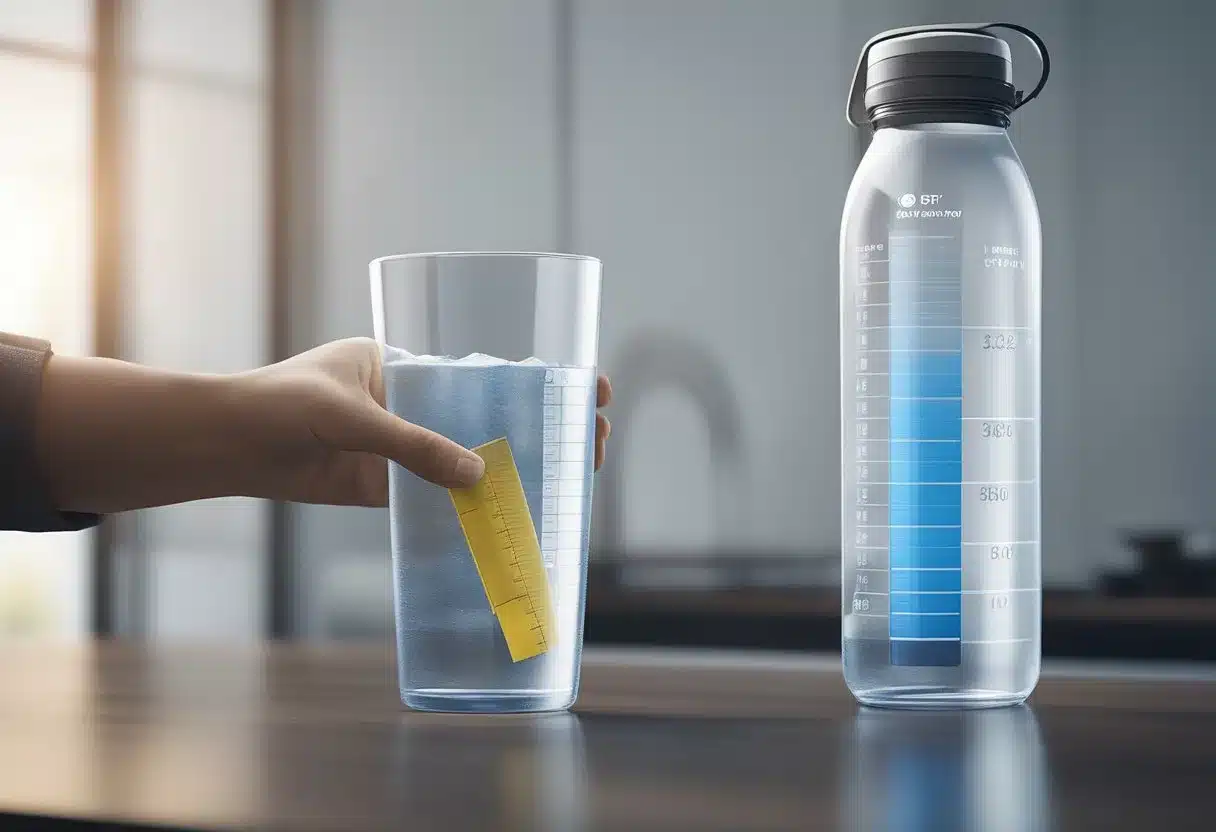
Proper hydration is crucial for maintaining good health. It’s important to recognize symptoms of dehydration and avoid over-hydration. Consistency in fluid intake plays a key role in preventing these conditions.
Identifying Symptoms of Dehydration
Dehydration occurs when the body loses more fluids than it takes in. Common symptoms include thirst, dry mouth, and infrequent urination. With mild dehydration, individuals may also experience fatigue and confusion.
Severe dehydration can lead to more serious problems such as low blood pressure and rapid heartbeat. It is crucial to pay attention to signs of mild dehydration and address them promptly. Drinking water when feeling thirsty can prevent these symptoms from escalating.
Addressing Over-Hydration and Hyponatremia
While it’s important to drink enough water, over-hydrating can lead to hyponatremia, a condition where the body’s sodium levels become dangerously low. This often results from consuming excessive water, diluting the sodium in the bloodstream.
Symptoms include nausea, headache, confusion, and in severe cases, seizures. To prevent hyponatremia, balance water intake with the body’s needs. Pay attention to feelings of bloating or if urination is excessively frequent. Moderation is key.
Consistency in Fluid Intake
Maintaining a consistent fluid intake is essential for avoiding both dehydration and over-hydration. Experts often recommend daily fluid intake based on body weight. For instance, drinking half your body weight in ounces is a common guideline.
Spread fluid consumption throughout the day rather than consuming large amounts at once. This helps the body properly utilize the fluids and reduces the risk of sudden fluid loss or overloading the system. Drinking water regularly and not just when thirsty can aid in maintaining this balance.
Beyond the Basics of Hydration
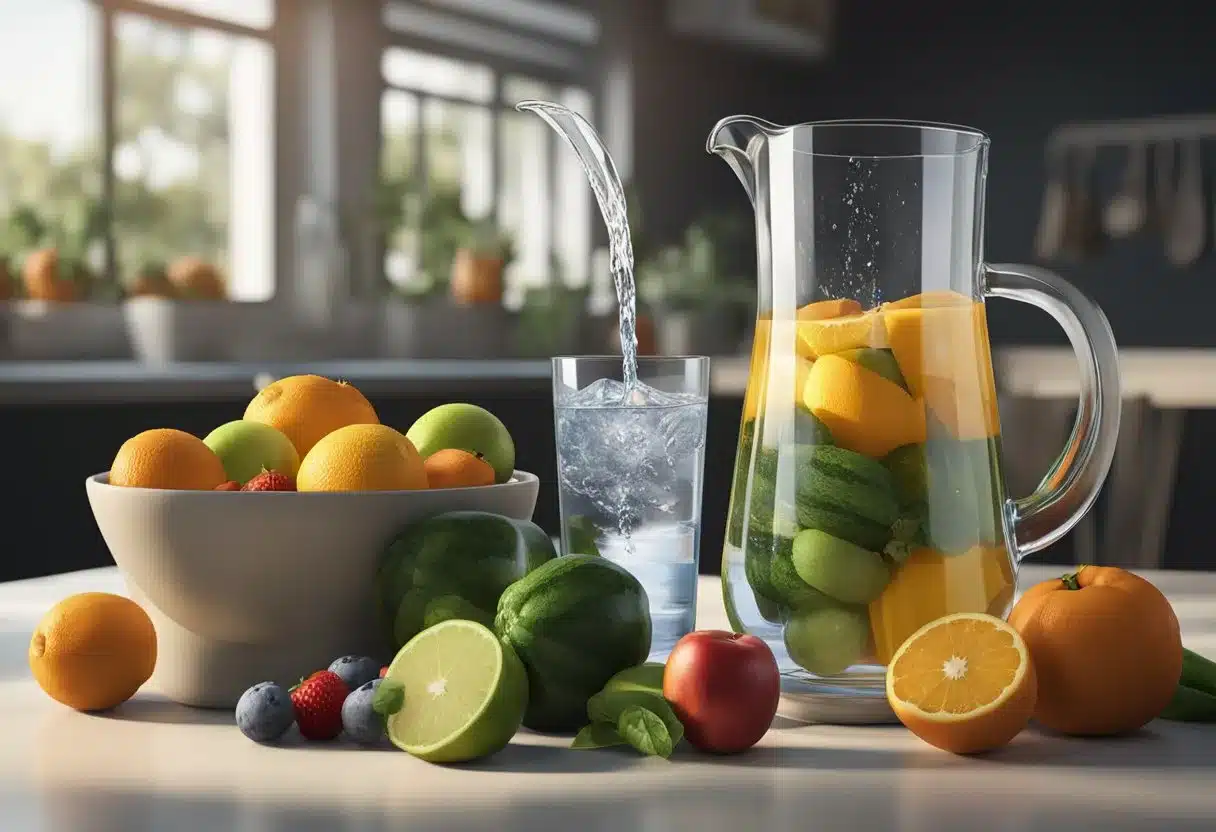
Hydration is crucial for everyone, but it becomes even more important for individuals with specific health conditions. Proper hydration also plays a vital role in how the body absorbs nutrients, enhancing overall wellness.
Water Intake and Chronic Health Conditions
For those with chronic health conditions, managing water intake can be more complex. Sodium levels are a key factor, especially for individuals with heart or kidney conditions. These conditions might require a restricted intake of both sodium and fluids.
Diabetes patients need to pay close attention to their water intake to manage blood sugar levels effectively. Energy drinks and caffeine should be consumed cautiously, as they can lead to dehydration.
Illnesses such as fever, vomiting, and diarrhea significantly increase the need for fluids. People on certain medications should consult their doctor to understand how these drugs affect their hydration needs. Keeping the body well-hydrated helps alleviate constipation and supports healthy joints. Regular discussions with healthcare providers are essential for personalized hydration advice.
Nutrient Absorption and Hydration
Hydration is pivotal for nutrient absorption. Water helps the body digest food more effectively and ensures that nutrients are transported to cells. For example, water-soluble vitamins like B and C require adequate water for optimal absorption.
Electrolytes such as potassium, magnesium, and sodium depend on water to maintain balance within the body. Drinking enough water enhances the absorption of these essential minerals, contributing to better energy levels and overall health.
Hydration also aids in the absorption of medicine, making it critical for those on regular medications to drink enough water. Dehydration can hinder the effectiveness of medications and nutrients, leading to potential health issues. Staying hydrated supports metabolic processes and helps prevent illnesses associated with nutrient deficiencies.
Special Considerations for Hydration
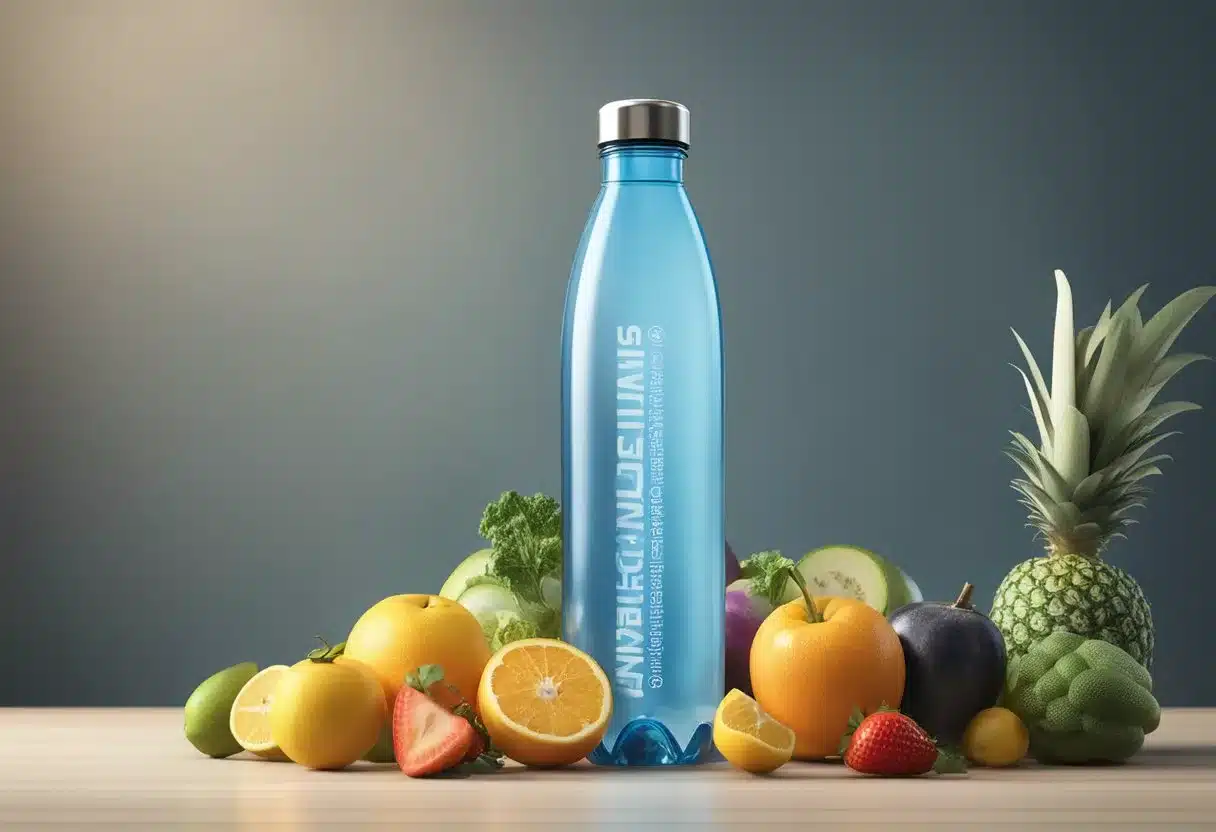
Different factors can affect how much water you need to drink. This includes weight management, age groups like the elderly and infants, and the types of drinks you consume, such as caffeinated and sugary beverages.
Hydration for Weight Management
Staying hydrated can play a significant role in weight loss. Drinking water before meals may help control appetite by causing you to feel full sooner, which helps you eat less.
Sometimes, people can mistake thirst for hunger, leading to unnecessary snacking. By drinking enough water, you can maintain better control over your calorie intake. Additionally, adequate hydration supports efficient metabolism, which is crucial for burning calories effectively.
Hydration Strategies for the Elderly and Infants
The elderly and infants require special hydration strategies. For the elderly, the sense of thirst diminishes with age, making dehydration a risk. Encouraging regular fluid intake throughout the day, even if they don’t feel thirsty, is crucial.
For infants, breast milk or formula provides the necessary hydration. As they start consuming solid foods, offering water in small amounts is important. Care must be taken to avoid over-hydration, which can be harmful to infants’ health.
The Impact of Caffeinated and Sugary Drinks
Caffeinated drinks like coffee and tea can have a diuretic effect, meaning they may cause the body to lose water. While moderate consumption is usually okay, relying solely on these drinks for hydration is not advisable.
Sugary drinks like soda and juice can contribute to dehydration due to their high sugar content. Instead of quenching thirst, they can lead to increased water loss and potentially contribute to weight gain. It’s better to drink plain water or low-sugar beverages to stay properly hydrated.
Frequently Asked Questions
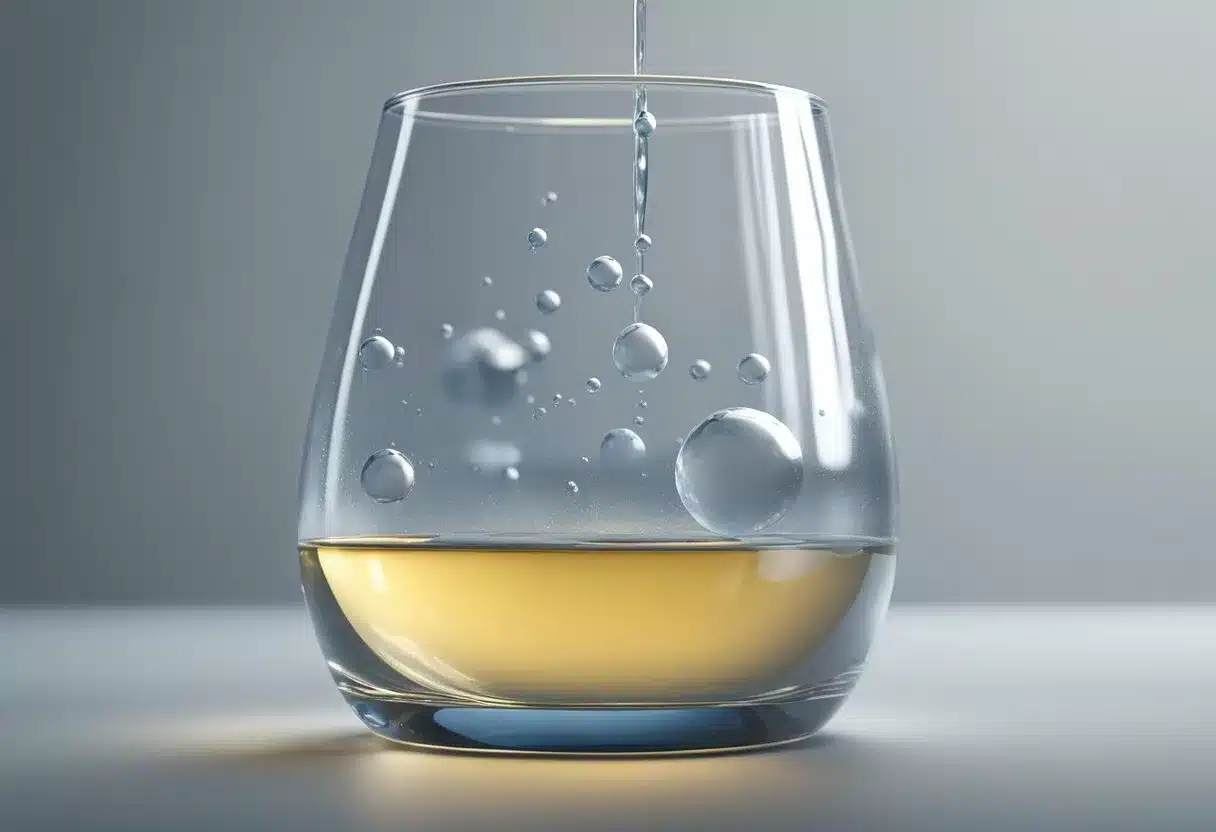
Daily water needs depend on various factors like age, weight, activity level, and whether you’re male or female. Specific guidelines can help determine the right amount for each person.
What factors determine the amount of water an individual should consume each day?
Several factors affect daily water intake. Age, weight, activity level, and climate all play significant roles in how much water one needs to stay hydrated.
Can drinking water needs be calculated based on weight, and if so, how?
Yes, calculating water needs based on weight is possible. A common guideline is to drink half an ounce to one ounce of water for each pound of body weight. For example, a 150-pound person might need 75 to 150 ounces of water per day.
What is the recommended daily water intake for men versus women?
Men typically need about 15.5 cups (3.7 liters) of fluids per day, while women need approximately 11.5 cups (2.7 liters). This includes fluids from water, other beverages, and food.
Is there an easy way to calculate daily water intake requirements?
An easy way to estimate daily water needs is to use body weight. Multiply your weight in pounds by 0.5 to 1 ounce. This range can help in determining a suitable amount of water for a day.
What are the signs of excessive water consumption?
Signs of drinking too much water include nausea, headache, and confusion. In severe cases, it can lead to hyponatremia, where the body’s sodium levels become dangerously low.
How do activity levels affect daily hydration needs?
Higher activity levels increase the amount of water your body needs. During exercise, it’s recommended to drink 7 to 10 ounces of water every 10 to 20 minutes to stay hydrated, especially during prolonged or intense activities.